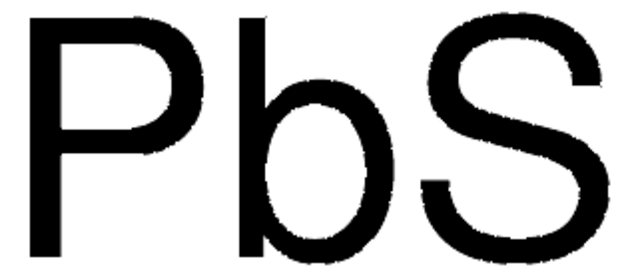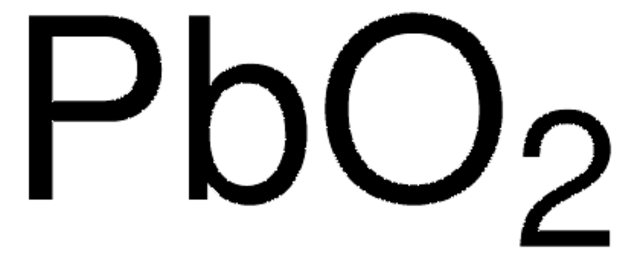おすすめの製品
グレード
for analytical purposes
アッセイ
99.995% trace metals basis
フォーム
powder and chunks
反応適合性
reagent type: catalyst
core: lead
不純物
≤55.0 ppm Trace Metal Analysis
密度
6.2 g/mL at 25 °C (lit.)
SMILES記法
[PbH2++].[O-]S([O-])(=O)=O
InChI
1S/H2O4S.Pb/c1-5(2,3)4;/h(H2,1,2,3,4);/q;+2/p-2
InChI Key
KEQXNNJHMWSZHK-UHFFFAOYSA-L
類似した製品をお探しですか? 訪問 製品比較ガイド
アプリケーション
- Lead(II) sulfate uses.: Widely recognized for its role in lead-acid battery technology, Lead(II) sulfate is pivotal in the production of battery plates. It contributes to the battery′s ability to store and release energy efficiently, which is critical in automotive and renewable energy storage applications (DOI: 10.1039/d3ra04386j).
シグナルワード
Danger
危険有害性情報
危険有害性の分類
Acute Tox. 4 Inhalation - Acute Tox. 4 Oral - Aquatic Acute 1 - Aquatic Chronic 1 - Repr. 1A - STOT RE 2
保管分類コード
6.1C - Combustible acute toxic Cat.3 / toxic compounds or compounds which causing chronic effects
WGK
WGK 3
引火点(°F)
Not applicable
引火点(℃)
Not applicable
個人用保護具 (PPE)
dust mask type N95 (US), Eyeshields, Gloves, type P2 (EN 143) respirator cartridges
適用法令
試験研究用途を考慮した関連法令を主に挙げております。化学物質以外については、一部の情報のみ提供しています。 製品を安全かつ合法的に使用することは、使用者の義務です。最新情報により修正される場合があります。WEBの反映には時間を要することがあるため、適宜SDSをご参照ください。
PRTR
特定第一種指定化学物質
労働安全衛生法名称等を表示すべき危険物及び有害物
名称等を表示すべき危険物及び有害物
労働安全衛生法名称等を通知すべき危険物及び有害物
名称等を通知すべき危険物及び有害物
Jan Code
254258-10G:4548173223247
254258-50G:4548173223254
254258-VAR:
254258-BULK:
254258-250G:
この製品を見ている人はこちらもチェック
資料
Since the first report of the low-cost dye-sensitized solar cell (DSSC) in 1991 by Gratzel and his coworker,1 dye-sensitized solar cells (DSSC) has been regarded as one of the most promising photovoltaic technologies because of their transparent and colorful characteristics, as well as low cost.
Since the first report of the low-cost dye-sensitized solar cell (DSSC) in 1991 by Gratzel and his coworker,1 dye-sensitized solar cells (DSSC) has been regarded as one of the most promising photovoltaic technologies because of their transparent and colorful characteristics, as well as low cost.
ライフサイエンス、有機合成、材料科学、クロマトグラフィー、分析など、あらゆる分野の研究に経験のあるメンバーがおります。.
製品に関するお問い合わせはこちら(テクニカルサービス)















